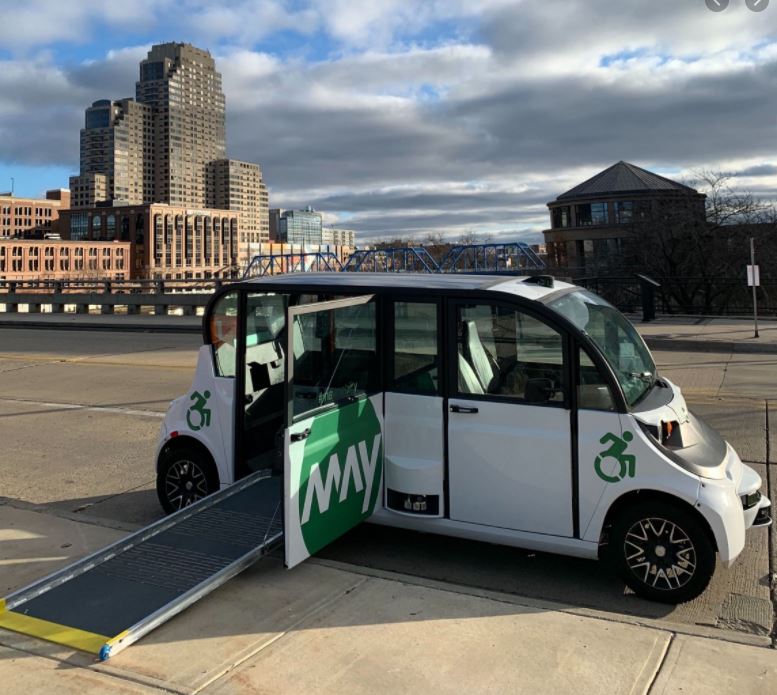Autonomous Vehicles and Persons with Disabilities
Overview of the MI-DDI Autonomous Vehicle Project

-
Identify current transportation gaps experienced by individuals with disabilities in Michigan,
-
Assess how AVs can bridge these gaps for persons with disabilities and their family members, and
- Determine how transportation officials, AV designers, and automobile developers can work to ensure that AVs are accessible and available to these users in the future.
A combination of statewide focus groups and a Delphi Panel of experts was used to gather data and arrive at final recommendations. Eight focus groups with individuals with disabilities and family members were conducted. Information learned from focus groups was used to build an online survey which was completed by a 10-person Delphi Panel. The Panel members rated each survey item's level of priority (not a priority, low priority, high priority).
In the end, a set of ten (10) recommendations was developed from the Delphi Panel's results. The focus groups and Delphi Panel participants identified strategies and best practices that need to be considered when developing and designing AVs. These recommendations emphasize the need to ensure that AVs provide individuals with disabilities increased mobility and independence, without presenting additional transportation barriers.
Recommendations and other findings were written into a White Paper that was distributed to stakeholders throughout Michigan. The White Paper can be accessed and downloaded through the links below:
Access the Autonomous Vehicle Project White Paper
Direct link to the White Paper to copy and paste:
https://ddi.wayne.edu/av_paper_links/mi-ddi_autonomous_vehicle_white_paper_2021.pdf
Recommendations for Future Action in Michigan
Download a PDF version of the recommendations.
| Recommendation #1 | Focus transportation advocacy efforts on current scheduling practices and related policies affecting how individuals with disabilities can effectively and realistically use existing public transportation options in their communities (e.g. busses, shuttles, door-to-door services, paratransit). |
| Recommendation #2 | Harness mobility research and collaborative work being done by universities, organizations, and companies throughout Michigan to address the transportation needs of individuals with disabilities in both rural and urban settings. |
| Recommendation #3 | Engage individuals with disabilities, service providers, employment specialists, advocates, state legislators, and other key stakeholders to brainstorm solutions to the growing need for Direct Support Professionals (DSP) to provide essential care, including transportation, for individuals with disabilities. |
| Recommendation #4 | Connect individuals with disabilities with AV designers, developers, and manufacturers to facilitate idea sharing and training opportunities throughout the research, development, and testing phases of this emerging technology. |
| Recommendation #5 | Facilitate opportunities for individuals with disabilities to directly use and/or engage with existing autonomous transportation while providing a platform for them to give feedback and ask questions. |
| Recommendation #6 | Create an ongoing dialogue between persons with disabilities and local, county, and state transportation authorities to ensure the voices of individuals are heard as AV technology is integrated into the current transportation landscape. |
| Recommendation #7 | Create awareness and advocacy focused on ensuring that there is financial equity regarding the cost to own and/or use autonomous vehicles as they become more available to the public. |
| Recommendation #8 | Review how funding sources such as transportation vouchers and Social Security benefits can be applied to diverse transportation options such as ride sharing programs (e.g. Uber, Lyft) and how this will work with AVs. |
| Recommendation #9 | Work with autonomous vehicle manufacturers and transportation authorities to create a priority for them and others to make publicly operating AV bus and shuttle services available to individuals who would be most immediately impacted by their use (e.g. individuals with disabilities, aging adults, transportation disadvantaged). |
| Recommendation #10 | Through information sharing and advocacy efforts, create awareness of the potential positive impact that AVs could have on the independence, community connectedness, and overall quality of life of individuals with disabilities and their families. |
For More Information
The MI-DDI AV Project was conducted by Michael Bray, MI-DDI's Associate Director for Dissemination and Technology. If you would like to learn more about the project, the recommendations, or possible collaboration in this space, please contact Michael:
Dissemination and Technology. If you would like to learn more about the project, the recommendations, or possible collaboration in this space, please contact Michael:
Michael's email: mikebray@wayne.edu
Michael's WSU Profile: https://ddi.wayne.edu/profile/ai3063